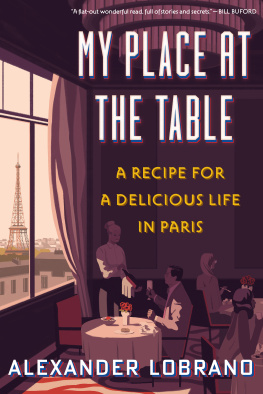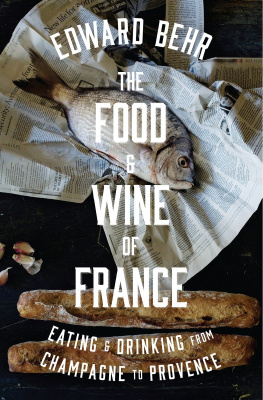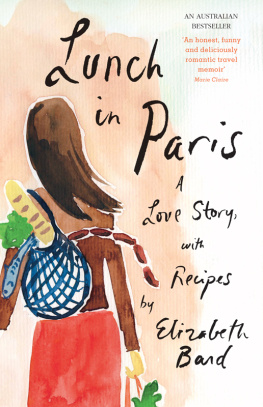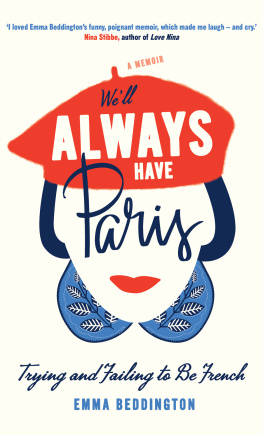Copyright 2021 by Alexander F. Lobrano Jr.
All rights reserved
For information about permission to reproduce selections from this book, write to or to Permissions, Houghton Mifflin Harcourt Publishing Company, 3 Park Avenue, 19th Floor, New York, New York 10016.
hmhbooks.com
The Library of Congress has cataloged the print edition as follows:
Names: Lobrano, Alec, author.
Title: My place at the table : a recipe for a delicious life in Paris / Alexander Lobrano.
Description: Boston : Houghton Mifflin Harcourt, 2021. | A Rux Martin Book.
Identifiers: LCCN 2020044144 (print) | LCCN 2020044145 (ebook) | ISBN 9781328588838 | ISBN 9780358307099 | ISBN 9780358311249 | ISBN 9781328585219 (ebook)
Subjects: LCSH : Lobrano, Alec. | Food writersFranceBiography. | Dinners and diningParisFrance. | Cooking, French.
Classification: LCC TX649.L63 A3 2021 (print) | LCC TX649.L63 (ebook) | DDC 641.5944092 [ B ]dc23
LC record available at https://lccn.loc.gov/2020044144
LC ebook record available at https://lccn.loc.gov/2020044145
v3.1121
Cover design by Christopher Moisan
Cover illustration Emiliano Ponzi
Author Photograph Steven Rothfeld
For Bruno Jean Roland Midavaine, my spouse;
my dearly missed friend Judith Devreaux Fayard,
who gave me so many chances;
and everyone who has ever cooked for me
What we notice in stories is the nearness
of the wound to the gift.
JEANETTE WINTERSON
(from an interview)
Acknowledgments
My eternal thanks to my mother, for lighting the wick of my curiosity, and my father, for his sense of fun and the harshness that made me strong.
Also to my grandmother Jean, for the love, wit, intelligence, and generosity that guided me through my early years, and the dozens of brilliant teachers and professors who made my mind their garden: Mrs. Hogenauer, Miss Gorham, Miss Armitage, Mrs. Lewis, Mrs. Robotham, Miss Fleissig, Professor Holdreith... the list is much too long to be fully unpacked here. To Ruth Leahy at the Weston Public Library, who comforted, nurtured, and groomed me.
To Tom Crane, for teaching me to cook and for his patience, and Marc Parisot, for the day he took me into the glise de la Madeleine in Paris.
To the editors who gave me work and the fellow writers with whom Ive shared a career, including Joe Fox at Random House, Julia Glass, Michael Luther, Gary Walther, William Sertl, Ruth Reichl, Beth Kracklauer, Kevin Doyle, Debi Dunn, Barbara Fairchild, Malachy Duffy, Catherine Bigwood, Stephen Brewer, Natasha Edwards, Karen Albrecht, Christine Muhlke, Ted Moncreiff, Hanya Yanigahara, James Oseland, Andrew Powell, Deborah Gottleib, and many others. To all of the friends whove shared meals with me, including Elizabeth Lobrano, Joel Paul, Laurie Eastman, John Philip, Kato Wittich, Ken Buck, Lisa Bannon, Christa Worthington, Judy Fayard, Nanette Maxim, David Lebovitz, Claire and Denis Quimbrot, Alexandra Marshall, and many more. To Deborah Ritchken, Susanna Porter, and Christopher Steighner, with whom I published Hungry for Paris and Hungry for France. To my wonderful agent, Jane Dystel, and my brilliant editor, Rux Martin, for bringing this book into the world with me. My sincere thanks to Susanna Brougham for her superb copyediting.
1
The Little Footprint
The gray pencil script on the soft sheet of ruled yellow paper was my own embarrassingly loopy second-grade handwriting. I started reading The Very Best Sandwich:
The BLT is the most perfect sandwich. The bacon brings it salt and the rich taste of pork. The tomato is sweet and juicy, and the lettuce is crunchy. The mayonnaise makes them all friends. Mom likes them made with toasted white bread, but I prefer rye bread, because of the little sweet seeds called caraway. Iced tea is a good drink with them.
I found the little essay in a bulging brown accordion file marked ALEC that my mother had given me when she moved to an assisted-living community. Filled with snapshots, clippings, report cards, and vaccination records, it was a time capsule of my first seventeen years. I so clearly remembered the May morning when Id written my ode to a sandwich, I could almost smell the chalk dust in the air of that grade-school classroom as the sun poured in through its tall windows.
Today I want you to write me a paper about one of your very favorite things, said Miss Armitage. Your subject might be your dog, or a song, or a game. It could even be a flower. She smiled at me. It can be anything you chooseexcept for books, which well keep for book reports, but it should be something you really like a lot. I want you to explain to me why you like it so much too. You have thirty minutes to complete this assignment, so keep track of your time. She nodded at the clock on the wall. And I dont want you doing a lot of erasing. Think before you write.
I stared at the bouquet of frilled pink peonies in the heavy glass vase on the corner of Miss Armitages desk. When Id come into the empty classroom early that morning, Id found her trimming their stems before she arranged them, and Id told her that peonies were my favorite flowers. She said they were hers too.
I wouldnt write about them, though. Flowers werent an appropriate interest for boystoo girly. Thats what my father had told me after Id asked my grandmother for some tulip bulbs as a birthday present the previous October.
I thought of writing about going to the beach because I loved the briny smell of the sea and the calm that came from sitting at the edge of a body of water I couldnt see the end of. I hoped there was some unknown place beyond it where no one knew me, and that place would make me free. Then I had another ideaId write about my favorite sandwich. I picked up my pencil. Would Miss Armitage think this was a silly subject? I hesitated. I could also write about the old apple tree I liked to climb up into and read. I was sure shed like that. Ten minutes had already gone by. I decided to risk the sandwich.
At the end of the following day, just before we left the classroom to go home, Miss Armitage distributed our essays. Glancing at my grade, I ran home from school and found my mother reading in the living room.
Im very proud of you! she said after shed seen my A. What was the assignment Miss Armitage gave you, sweetheart?
I explained.
You really do love to eat, dont you? she said with a smile, and gently shook her head.
That night, after my father had come home from his office in New York City and changed out of his suit, my mother poured him a short glass of cocktail sherry. Hed put on his good luck sweater from college, the old ivory-colored tennis pullover with bands of navy and maroon at its V-neck; hed never lost a game when he wore it. Now he stood at the desk in the living room, glancing through the mail. I watched him through the open door of the TV room.
Alec had a very good day today, I heard my mother say as she handed my father my essay.
He read it, then dropped it into the wastepaper basket. Alec! he shouted, and I came to the doorway. How could you write such a dumbbell paper? It makes you sound like a real dope.
Miss Armitage gave him an A, Sandy, my mother protested.
He ignored her. The next time you write about your favorite thing, it should be ice-skating, baseball, or football, he said. Or your dog, or going fishing, or climbing a tree.
I almost wrote about climbing a tree, I told him.
Why didnt you?
I shrugged. I decided it would be more interesting to write about a BLT.
My father glared at me and shook his head.
What I didnt know then was that food would become my muse, my metaphor, and my map for making a place for myself in the world and finding my place at the table.






